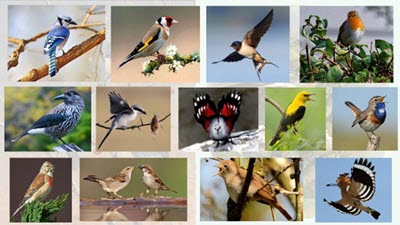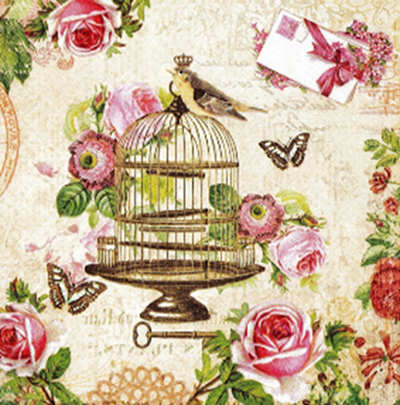The Bird Cage

The elegant swallow flies, twirls and frolics gracefully in the air,
Above the river these little arrows with forked tails spin, sunny,
With her skill and speed, she eliminates mosquitoes and midges,
Built by an agile beak, the dried mud provides a cozy nest for its chicks.
The robin, this charming little bird, is one of your most precious allies in the garden,
He is the guardian of your green space with his melodious song,
A real feathered assistant alerting other inhabitants of the garden to potential dangers,
It feasts on harmful insects like aphids, mosquitoes and other strangers.
In the Ariège wastelands, teasels with long prickly stems shelter the winged population,
On each floor of skyscrapers, basins formed by leaves collect raindrops,
It’s the cabaret of the piafs, but besides the drink you can also break the seed, cuicui,
Our elegant goldfinch with its colorful costume gorges itself with a large beak, between the thorns, without stinging itself.
In the sky the autan or the burle makes Goliath spin with its wings,
Excellent sailboat, expert in aerial acrobatics, the ebony bird,
Mr. Raven, seized with a touch of madness, waltzes for the one he loves,
The dark ones follow in a subtle choreography, loops and candles.
Crest pointed back in its silky livery with colorful notes,
Variegated flight feathers, yellow caudal band, topped with a pinkish-brown crest,
Decorated with its “drops of wax” on the secondary caudal feathers,
It comes to us directly from the Siberian cold, hello to the Bohemian Waxwing.
For the month riding on Ventôse and Germinal the cuckoo returned from his African stay,
Its two typical syllables announce the big news, Spring is finally here,
Popular belief, some people think that if they have money in their pocket,
During its first song, they will be rich all year round, fastoche!
Our morning singer, this elf in a black tailcoat, has resumed his hopeful trills,
Despite the icy air of February mornings, in his improvised repertoire,
His hymn to joy brings balm to the heart with its fluted notes,
Rumbling the lazy dawn to activate Spring, here is the blackbird.
To be at ease, she chooses larch, spruce or fir forests,
Fond of seeds, she dislodges the scales of the “pine cones” with a dexterous beak.
This supercharged person also inspects the cracks in the bark in search of insects and spiders,
Here is the black tit in its harmonious clothes of gray, white and glossy black.
It suddenly appears in the middle of the foliage, like a jewel emerging from its case,
Endowed with an exceptional memory, he hides his acorns to find them without witnesses,
The jay is called the guardian of the forest, its alarm cry alerts its fellows,
When you see this magnificent bird passing by, fully enjoy this fleeting moment.
In the barely outlined foliage it is the time of parades for the birds,
She runs on the trunks looking for a hole to make her nuthatch nest.
From dawn we get our ears full of it when a multitude of songs wake up the forest,
The cute finch in his purple doublet sings his song under his blue helmet.
Master Martin, perched on a tree, held in his beak a fish caught on the sand pit,
Arrow of turquoise, orange and metallic reflections, it patrols the river,
It spends a lot of time on a branch watching for its prey to pass by,
Sure of his move, he dives in and pulls out his grip on the mandibles, in joy.
The feathered people think of finding a soul mate to ensure their descendants,
Mating season obliges, the plump bird has put on its wedding costume with elegance,
In olive tones, enhanced with pretty golden braid, the male greenfinch, in measure,
Screaming while flying, this feathered seducer draws beguiling circles in the azure.
Returning from its African wintering, the bird with salmon plumage has reinvested in the bocages,
In the warmth of spring we let ourselves be lulled by its repeated over and over again,
She often emits her sweet song from the top of a low wall or a thicket,
Its discreet sound contrasts with its erect crest and the exuberance of its plumage.
Its name is a poem, the male bird with the cobalt blue of its sublime plastron,
Featuring an immaculate white spot in its center, the makeup mirror,
Through its cocktail of notes, the warbling of the bluethroat relates to its plumage,
An outstanding imitator, there is a nightingale, a lark and even a cricket in him.
Above the cultivated lands, moors and wastelands, the skylark chirps,
From a vertical flight it rises graying while fluttering in a hovering flight,
As if hanging by a thread, she dominates her territory to defend it as a mercenary,
Curious, she lets herself be hypnotized by the hunters' mirror without fear.
On a gentle March morning, a European starling vocalizes at the tip of a cute fir tree,
It warbles, gurgles, chatters, rattles, in a heterogeneous song with a bizarre harmony,
Its black plumage becomes iridescent during the mating season with green or purplish reflections,
Scratching the sky with its wings, in immense and sonorous clouds, it invents varied murmurs.
He is so small, with a very round body we nickname him cute and endearing hedge wren,
Small and discreet, the cute wren is an outstanding gardener,
It feeds on larvae, caterpillars, aphid flies and also opilions,
Under its brown, slightly striped plumage, its sonorous, high-pitched song makes it charming.
In the forest, two types of woodpeckers drum on the trees with mastery,
Both variegated with black backs marked with exquisite whiteness,
The woodpecker is distinguished by its bright red, wig-shaped cap,
While that of the great spotted woodpecker is black with a mustache at the nape of the neck.
Returning from his winter African resort, he launches his didelio, didelio,
Resounding with an impressive timbre, it is the melody of the oriole,
We listen to it in silence, hoping that it will fly away, seeing it being pure happiness,
In its sunny dress, this bird seems to have come out of a laughing fairy tale.
It is from May that it makes its night flights from the scrubby pine forest,
At dusk we set off to hunt insects in the neighboring moor,
The nightjar, opening its throat wide, captures its prey full of protein,
By uttering “yes, yes”, seductive hums for sulking females.
Slowly, the star-studded night envelops the wood in its purple muslin,
A light breeze touches the leaves of the trees which seem to whisper,
When an almost plaintive song rises in an explosion of crystalline notes,
The nightingale philomela launches its fluted melody under the veiled rising moon.
A mountaineer of origin, he frequents our towns and villages, perched on the ridge of a roof,
The male redstart, the color of soot, proudly launches his little king song,
It’s an accelerated chatter punctuated by sounds reminiscent of crumpled paper,
Its alarm calls, “tsip” rapid and short, come in eager bursts.
It can be seen hovering or flying above the meadows,
It is a valuable aid for farmers, it feeds on small rodents,
Shrews, mice and voles which could cause damage to crops,
The common kestrel is the predator that balances nature's ecosystem.
As the summer solstice approaches, the “strawberry moon” appears round, adorned with orange,
This is the period chosen by the two-tone serotine to settle under the cozy roofs,
This pretty bat with salt and pepper fur and a smoky snout,
Getting ready to give birth to twins, in four weeks they will be hunting happily.
With Floréal laughing, nature spins its enchanted merry-go-round,
Thanks to the pastoral symphony of the cheerful song thrush,
Mixing its melody with the fluted refrain of the black-headed warbler,
In the evanescent intoxication of the early flowers on the promenade.
Along the banks of the streams a graceful sparrow trots lightly,
Pearl gray suit, white mask and little black beret, what zealous elegance,
Nicknamed “rattletail” for the continual swinging of its long tail,
The wagtail spends its day in its quest for belligerent midges.
It is often at dusk that the Grand Duke launches his martial zombie “hoo-oh”,
Unforgettable vision of his silhouette under the moon while listening to his disturbing cry,
But what a pleasure to watch the goldsmith of the fir trees, the crossbill in his ruby livery,
Shelling spruce seeds using its crossed crescent-shaped mandibles.
Elegant with its dorsal plumage with metallic green reflections and its dark pink legs,
It is its long and thin tapered black crest which is the pride of this light migratory,
The wind making it wave softly or giving it a disheveled look,
It is in large flocks of fluttering flight that the crested lapwing migrates far from the frost.
The one we nickname “piaf” is part of our decor and our history,
Sieur Pierrot with a brown back striped with black wears a gray cap and a black bib,
Lady Moinelle with a duller dress offers a coquettish look behind her eye with her cream eyebrow,
The approaching winter will be difficult for the sparrows, so save them supreme crumbs.
Never placed on the ground, this strange bird clings vertically to uncomfortable walls,
With its claws and long beak, this cliff runner searches through gaping cracks,
It goes unnoticed under its ash gray plumage, but the echelon tick,
As soon as it spreads its wings, it jerkily reveals its flamboyant red feathers.
With its small sparrow size and its short, strong and conical beak of a granivore,
Its spring plumage is adorned with a delicate red on the forehead and two-tone chest,
Its melodious warbling of rare beauty charms its darling at the top of the bush, little,
Installed incognito in the gardens, they are pejoratively labeled as linnet heads.
As for the little masked bandit with his black silk blindfold over his eyes,
Strong beak and long tail composing its silhouette with a wing bearing a white shield,
It is perched at the top of a branch that the gray shrike watches for its prey,
That she will skewer a shrub thorn to store it or carve it up for blood.
Suddenly a powerful cre, cre, cre flies from the top of a royal conifer,
Could it be a master crow on his perched tree who would taste the autumnal sweetness,
Nay, at the top of the pines or larches it’s the speckled nutcracker,
A small corvid with chocolate plumage, dotted with drops of milk.
Like a mechanical toy, a feathered ball rotates uphill around a trunk,
Barely seen, already disappeared, the woodcreeper makes its ascent,
With its long curved beak, it skins pieces of bark used as traps,
To find a few insects, then flies away and begins its merry-go-round again.

Guy says l’Arié…..Joie
